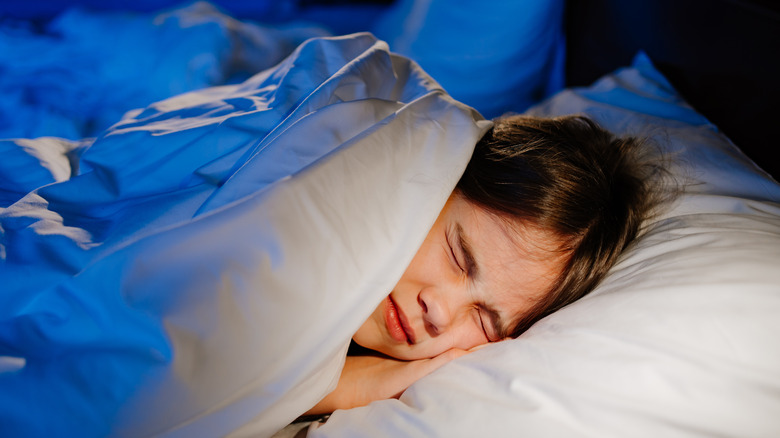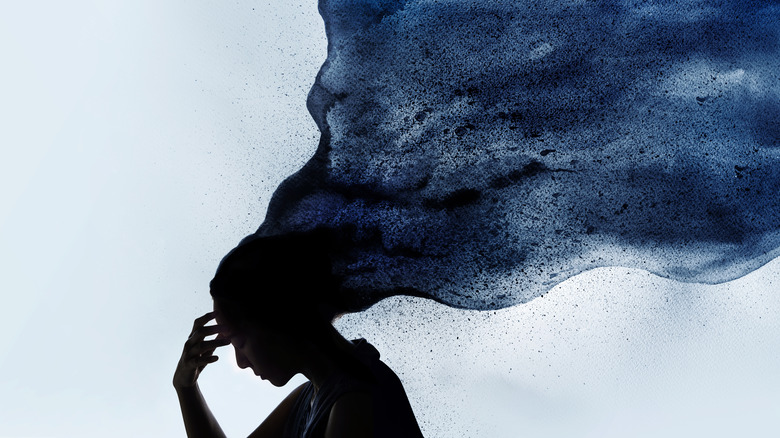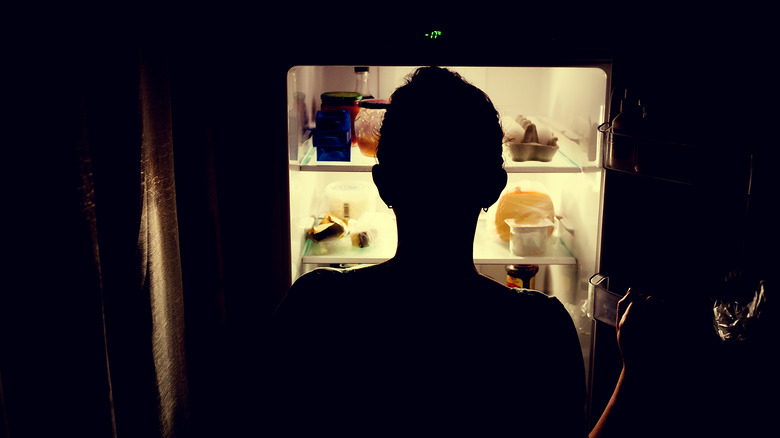Why You Have Nightmares
If you've ever started your day by waking up from a pleasant dream, you've probably also experienced the opposite. You go to sleep at night, everything seems fine, and you've no reason to expect anything short of a good night's rest. Then it happens. At some point during your sleep, you begin to experience a bad dream — a nightmare.
According to Mayo Clinic, a nightmare is "a disturbing dream associated with negative feelings, such as anxiety or fear that awakens you." It occurs during the phase of sleep known as the rapid eye movement (or REM) stage of sleep. According to Psychology Today, the average person dreams for up to two hours a night, usually in the latter half of the sleep cycle. Nightmares happen more frequently in women and adolescents and typically begin to happen less as a person grows older. However, an adult who experiences nightmares as a common occurrence may also experience something known as a nightmare disorder.
According to the Sleep Foundation, nightmares can have a significant impact on the quality of a person's sleep, and most of us have experienced them in some way. But why does this phenomenon occur? It turns out there's a reason these bad dreams happen, and some things might even increase their frequency.
Stress and anxiety can cause more frequent nightmares
If you've been having a particularly stressful time or experienced something that left you with feelings of anxiety, you might notice some changes in your sleep. This is because our stress and anxiety levels have a direct impact on not only our quality of sleep but on the likeness of us enduring a nightmare or two throughout the night. According to the Sleep Foundation, sad, traumatic, or stress-inducing situations heighten our risk of having a nightmare. In addition, a person who experiences chronic stress or anxiety on a regular basis is at a greater risk of having nightmares more frequently and developing a nightmare disorder.
If you notice your nightmares happen more when you're particularly stressed out or anxious about one thing or another, your bad dreams could be stress-related. According to Mayo Clinic, participating in stress-reducing activities like talking to someone or practicing deep breathing and relaxation techniques can reduce the likelihood of your sleep becoming disrupted.
If you or someone you know is struggling with mental health, please contact the Crisis Text Line by texting HOME to 741741, call the National Alliance on Mental Illness helpline at 1-800-950-NAMI (6264), or visit the National Institute of Mental Health website.
Drugs and medication can cause nightmares
Nightmares can be triggered by multiple things, including but not limited to the use and misuse of various drugs. According to The Recovery Village, certain prescription drug medications like antihistamines, antidepressants, and steroids can increase the likelihood of nightmares or the frequency in which they occur. Not every medication lists nightmares and sleep disruption as a side effect of taking them, but some medications that influence the neurotransmitters in our brains can have that effect, according to GoodRx Health.
Some prescribed medications may lessen the amount of REM sleep a person gets, and when a person stops taking these medications, their body might go into REM overdrive mode. These drugs may have an impact on the nervous system, and after a short time without ingesting them, the body needs to adjust to the lack of medication. This means that the REM sleep stage might occur more frequently, and with more REM comes more nightmares (via the Sleep Foundation).
Medical conditions can have a negative impact on dreams
Some individuals are more prone to having nightmares, not through any fault of their own but because of certain medical disorders that can cause more frequent bad dreams and sleep disruptions. For example, those who experience depression or other mental health issues may have an increased rate of nightmares. Other medical conditions can impact sleep as well, including some cancers and heart disease (per Mayo Clinic).
Other medical disruptions like narcolepsy can also lead to bad dreams. Mayo Clinic describes narcolepsy as "a chronic sleep disorder characterized by overwhelming daytime drowsiness and sudden attacks of sleep." These can disrupt a person's REM sleep process and cause the body to engage in more nightmares, leaving them both tired and a bit freaked out by whatever it is they dream about.
Some medical conditions are unavoidable or difficult to avoid, and this means that there's a portion of the population that suffers from scary dreams more frequently than others, and it's entirely out of their control.
Eating close to bedtime creates a more active REM stage
Have you ever eaten something and then had wild dreams? Or bad dreams? Maybe even a nightmare? If you have and then immediately started to blame a sweet or spicy before-bed snack, you aren't alone. However, it might not be what you ate that's to blame for your imagination running on overdrive. Instead, it might be when you ate.
Dr. Charles Bae is a sleep medicine doctor at Sleep Disorders Center at the Cleveland Clinic and says that eating any type of food just before bed can lead to increased nightmares as it raises both metabolism and temperature (per NBC News). Both of these occurrences lead to a rise in brain activity, which creates a more active REM stage throughout the night. This means your dreams or your nightmares can become a lot more vivid and scary.
So if you experience nightmares, it's okay to eat spicy and sweet foods as they aren't necessarily the culprit of whatever your mind can conjure up — it's when you eat them that really matters the most.
It isn't just scary movies that cause scary dreams
For some people, the effects of scary movies or television shows are long-lasting and impact more than just the popcorn that gets tossed in the air at each jump-scare. However, it might not be one specific genre that's to blame if you're experiencing a sudden increase in bad dreams or sleep disruption. According to a study published in the Journal of Clinical Sleep Medicine and conducted by the University of Toledo's Department of Health and Recreation, excessive television can lead to increased rates of anxiety and sleep disruptions, which can create more nightmares. While the horror genre, in particular, can raise adrenaline and lead to sleep problems, the study also shows that those who watch two hours of TV per night are at a higher risk of depression and lower sleep quality.
So while there may be plenty of movies and shows you need to catch up on, moderation is key if you want to keep to a good nighttime routine with the least amount of disturbing dreams possible. And remember: it's not just the scary shows that cause scary dreams.





